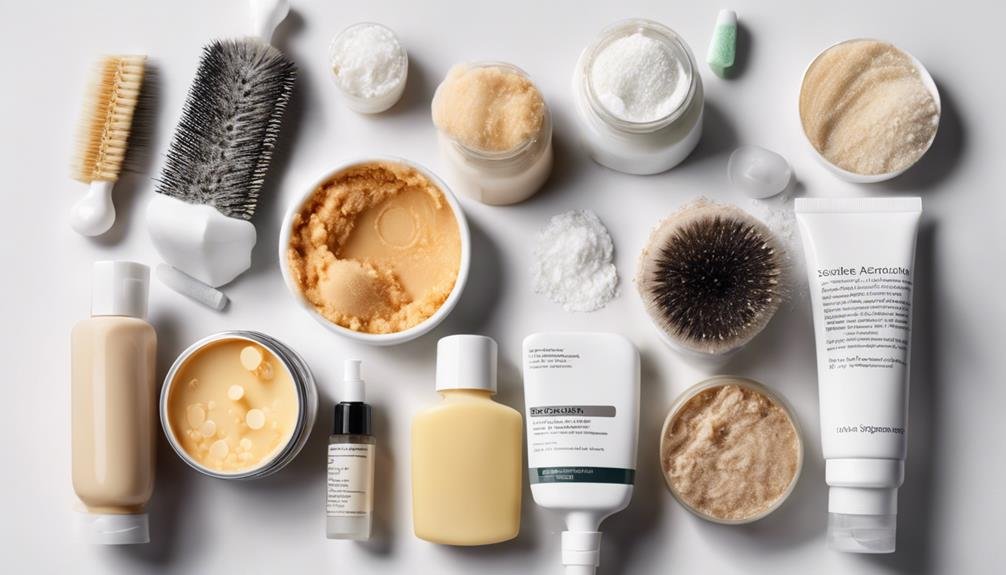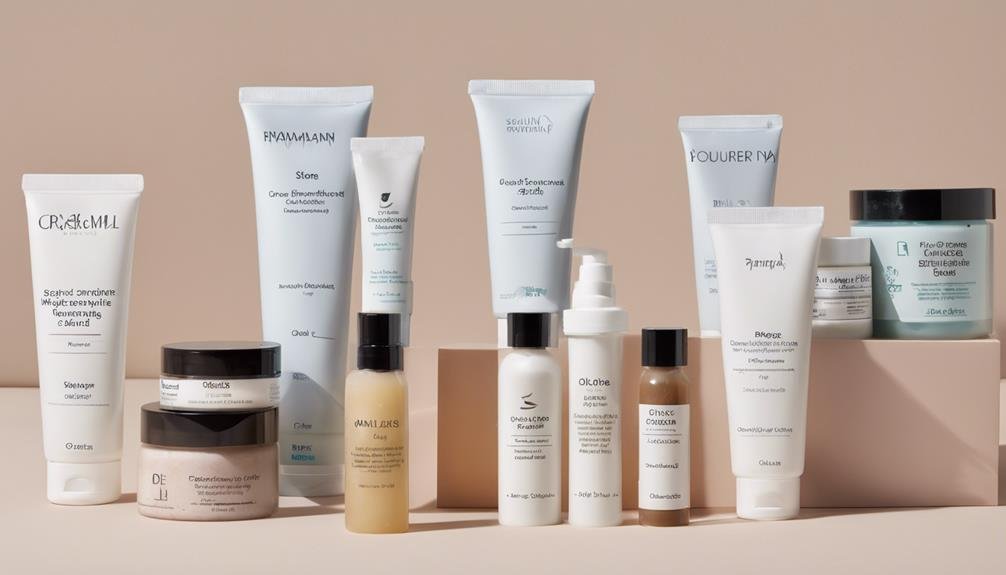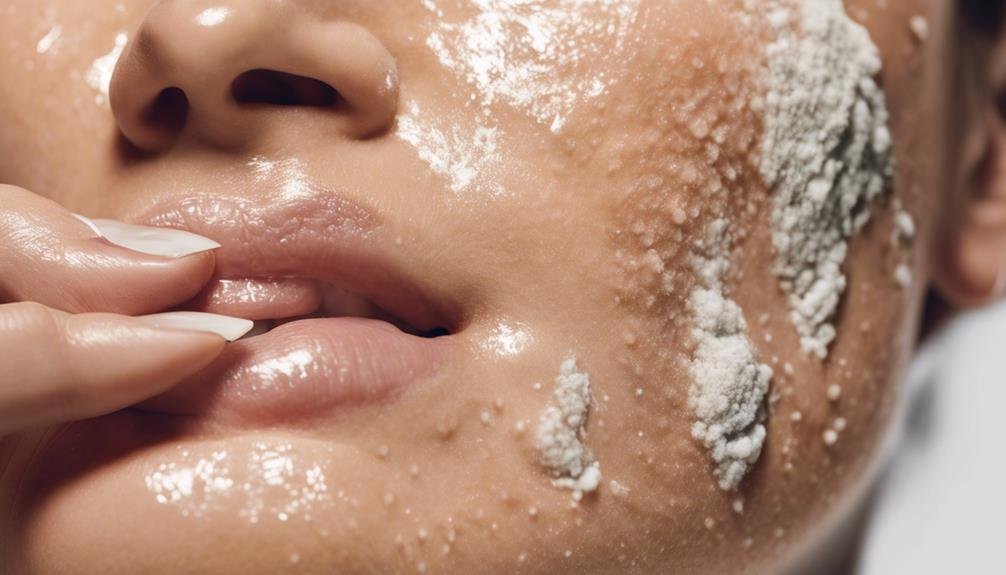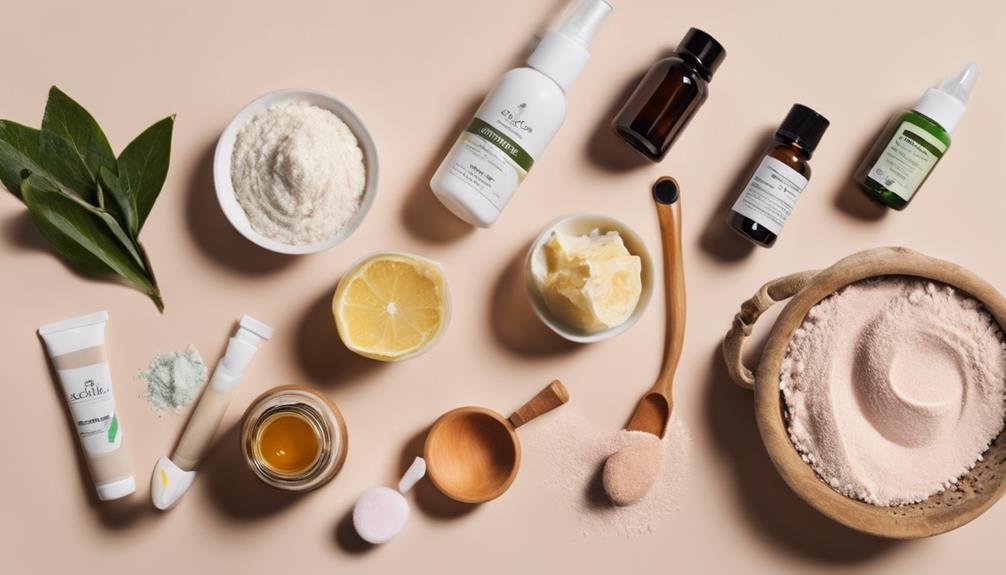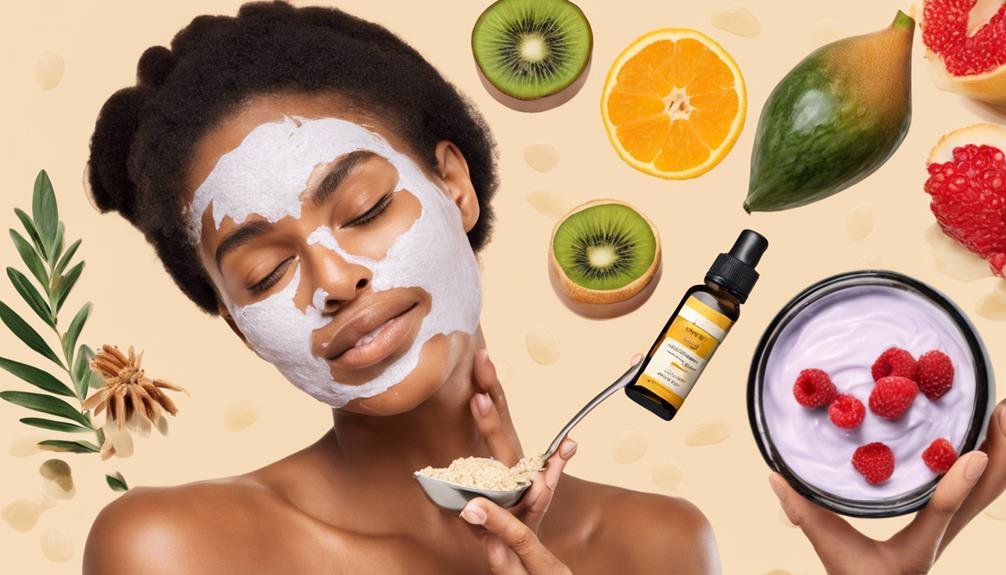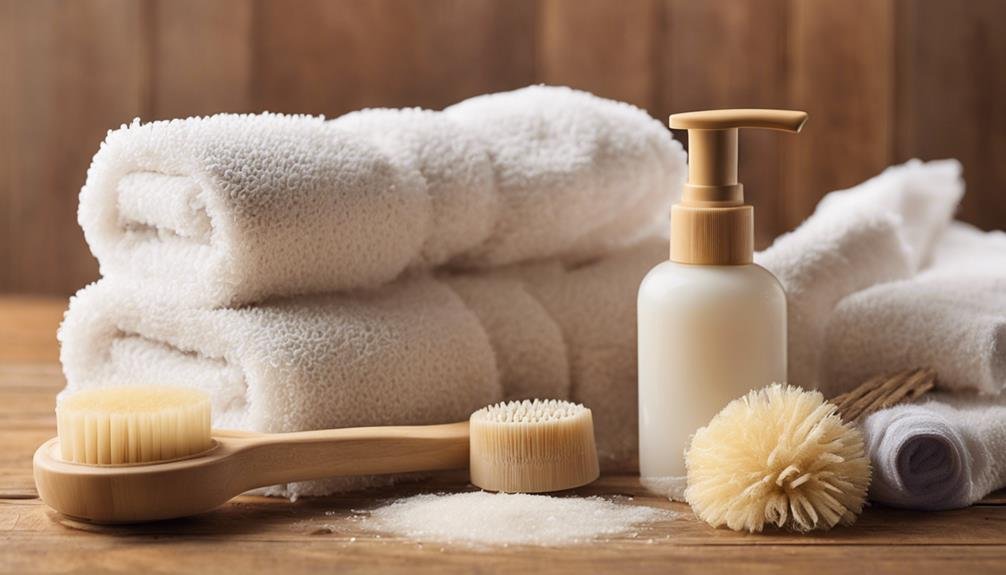When it comes to achieving a clear complexion, the key lies in understanding the delicate balance of exfoliation. But how do you navigate the vast array of products and techniques to find what truly works for your skin? By uncovering the secrets behind effective exfoliation tips tailored to your unique needs, you can unlock the path to a smoother, more radiant appearance.
Key Takeaways
- Choose the right exfoliant for your skin type and concerns.
- Gently exfoliate with circular motions to avoid irritation.
- Follow a post-exfoliation skincare routine with moisturizer and sunscreen.
- Consider professional exfoliation treatments for advanced results.
- Maintain a consistent exfoliation schedule based on your skin type.
Importance of Exfoliation
Exfoliation plays a crucial role in maintaining clear and healthy skin. By removing dead skin cells from the surface, exfoliation helps to unclog pores, prevent breakouts, and improve skin texture. Regular exfoliation also promotes cell turnover, revealing fresh, radiant skin underneath. Not only does this process enhance the effectiveness of your skincare products, but it also allows for better absorption of moisturizers and serums, maximizing their benefits.
Furthermore, exfoliation can help fade dark spots, hyperpigmentation, and acne scars over time, leading to a more even skin tone. It can also stimulate collagen production, reducing the appearance of fine lines and wrinkles.
However, it's essential to exfoliate gently and avoid overdoing it, as excessive exfoliation can damage the skin barrier and cause irritation.
Different Types of Exfoliants
Among the array of skincare products available, various types of exfoliants offer distinct benefits for achieving clear and radiant skin. When choosing an exfoliant, it's essential to understand the different types and their specific functions. Here is a breakdown of common exfoliants:
| Type | Description |
|---|---|
| Physical | Contains granules or particles to physically scrub away dead skin cells. |
| Chemical | Uses acids like AHAs, BHAs, or enzymes to dissolve and remove dead skin cells. |
| Enzymatic | Contains natural enzymes like papain or bromelain to gently exfoliate the skin. |
| Peeling Gels | Formulated with ingredients that ball up upon application, removing dead skin as they are massaged onto the face. |
| Scrubs | Typically a combination of physical and chemical exfoliants for a more thorough removal of dead skin cells. |
Understanding the differences between these exfoliants can help you choose the right one for your skin type and concerns. Each type offers unique benefits, so experiment to find the one that works best for you.
Choosing the Right Exfoliant
When selecting the right exfoliant for your skincare routine, it's important to consider factors such as your skin type, concerns, and desired outcomes.
For sensitive or dry skin, opt for gentle exfoliants like lactic acid or enzyme-based products to avoid irritation.
If you have oily or acne-prone skin, salicylic acid or benzoyl peroxide can be effective choices to unclog pores and reduce breakouts.
Combination skin may benefit from a mix of exfoliants, targeting different areas accordingly.
Those with mature skin can consider alpha hydroxy acids (AHAs) or retinol-based exfoliants to promote cell turnover and improve texture.
It's crucial to patch test new exfoliants to ensure compatibility and avoid adverse reactions. Look for products with appropriate concentrations of active ingredients to prevent over-exfoliation.
Always follow the instructions provided by the manufacturer and start with a lower frequency to gauge your skin's response.
Consulting a dermatologist for personalized recommendations can also be beneficial in selecting the right exfoliant for your specific skin needs.
Frequency of Exfoliation
Maintaining an appropriate frequency of exfoliation is crucial for achieving clear and healthy skin. Exfoliating too often can lead to irritation, while not exfoliating enough can result in buildup and clogged pores. Finding the right balance is key to revealing a radiant complexion. Here is a simple guide to help you determine how often you should exfoliate based on your skin type:
| Skin Type | Frequency of Exfoliation |
|---|---|
| Dry | 1-2 times per week |
| Normal | 2-3 times per week |
| Oily | 3-4 times per week |
Proper Exfoliation Techniques
Proper exfoliation techniques play a vital role in achieving smooth and clear skin. When exfoliating, it's important to choose the right type of exfoliant for your skin type.
Physical exfoliants, like scrubs or brushes, work by physically removing dead skin cells, while chemical exfoliants, such as AHAs or BHAs, dissolve the bonds between skin cells to reveal fresh skin.
To properly exfoliate, start by cleansing your face to remove any dirt or makeup. Then, apply a small amount of exfoliant to your fingertips and gently massage it into your skin using circular motions. Be sure to avoid the delicate skin around your eyes. Rinse thoroughly with lukewarm water and pat your skin dry.
For best results, exfoliate 1-3 times a week, depending on your skin type and the type of exfoliant you're using. Over-exfoliation can damage the skin barrier, so it's crucial to listen to your skin's needs and adjust your exfoliation routine accordingly. Proper exfoliation will help unclog pores, prevent breakouts, and reveal a brighter, smoother complexion.
Avoid Over-Exfoliation
To achieve optimal skin health, it's crucial to be mindful of the risks associated with over-exfoliation. While exfoliation is beneficial for removing dead skin cells and revealing a brighter complexion, excessive exfoliation can lead to irritation, redness, dryness, and even damage to the skin barrier. Overdoing it can disrupt the skin's natural balance, making it more susceptible to environmental stressors and breakouts.
It's important to listen to your skin's needs and adjust your exfoliation routine accordingly. If you notice signs of over-exfoliation such as increased sensitivity or inflammation, it's time to dial it back. Consider reducing the frequency of exfoliation or using a milder exfoliant to give your skin a chance to recover.
Exfoliating for Acne-Prone Skin
If you have acne-prone skin, incorporating exfoliation into your skincare routine can help manage breakouts and improve the overall condition of your skin. Exfoliation can effectively remove dead skin cells, excess oil, and impurities that can clog pores and contribute to acne flare-ups. However, it's crucial to choose the right exfoliation method to prevent irritation and further aggravation of your skin.
For acne-prone skin, gentle physical exfoliation with a soft brush or a mild scrub can be beneficial. Avoid harsh scrubs with large particles that can cause micro-tears in the skin. Opt for products containing ingredients like salicylic acid or benzoyl peroxide, known for their acne-fighting properties. These ingredients can penetrate the pores and target acne-causing bacteria, helping to reduce breakouts over time.
Remember to exfoliate no more than 2-3 times per week to avoid over-exfoliation, which can strip the skin of its natural oils and lead to increased sensitivity. Always follow up with a hydrating and soothing moisturizer to keep your skin balanced and healthy.
Benefits of Chemical Exfoliation
Chemical exfoliation offers numerous benefits for those looking to improve their skin's texture and appearance. Unlike physical exfoliants that scrub the surface of your skin, chemical exfoliants work by dissolving dead skin cells and unclogging pores, resulting in a smoother and brighter complexion.
Here are three key benefits of incorporating chemical exfoliation into your skincare routine:
- Enhanced Skin Renewal: Chemical exfoliants, such as AHAs (alpha hydroxy acids) and BHAs (beta hydroxy acids), promote cell turnover, helping to reveal fresher, healthier skin underneath.
- Improved Skin Tone: Chemical exfoliation can help fade dark spots, hyperpigmentation, and acne scars over time, leading to a more even skin tone.
- Reduced Fine Lines and Wrinkles: By removing dead skin cells and stimulating collagen production, chemical exfoliants can help minimize the appearance of fine lines and wrinkles, giving your skin a more youthful look.
Integrating chemical exfoliation into your skincare regimen can bring about significant improvements in the overall health and appearance of your skin.
DIY Exfoliating Recipes
Exfoliation is a key aspect of any skincare routine, helping to slough off dead skin cells and reveal a radiant complexion underneath. If you're looking to incorporate a more natural approach to exfoliation, DIY exfoliating recipes can be a great option.
One simple recipe involves mixing finely ground oatmeal with honey to create a gentle scrub that helps to remove dead skin cells while soothing the skin.
Another popular DIY exfoliating recipe includes combining sugar with coconut oil to create a more abrasive yet effective scrub. The sugar helps to physically exfoliate the skin, while the coconut oil provides moisture and nourishment.
Additionally, mixing coffee grounds with olive oil can create a stimulating exfoliant that can help improve circulation and leave your skin feeling invigorated. Remember to be gentle when using these DIY exfoliating recipes to avoid irritating your skin and always follow up with a moisturizer to keep your skin hydrated and healthy.
Post-Exfoliation Skincare Routine
After exfoliating your skin, it's crucial to follow a post-exfoliation skincare routine to maintain the health and hydration of your skin. Here are some essential steps to incorporate into your post-exfoliation routine:
- Hydrate: After exfoliating, your skin may be more sensitive and prone to dryness. Apply a hydrating serum or moisturizer to replenish lost moisture and keep your skin supple.
- Protect: Sunscreen is a must post-exfoliation. Exfoliating can make your skin more vulnerable to UV damage, so be sure to apply a broad-spectrum SPF to shield your skin from harmful rays.
- Avoid Harsh Products: Steer clear of harsh chemicals or aggressive treatments post-exfoliation. Opt for gentle, soothing skincare products to prevent irritation and maintain the benefits of exfoliation.
Exfoliating Body Treatments
To effectively rejuvenate and revitalize your skin beyond just your face, incorporating exfoliating body treatments into your skincare regimen can be highly beneficial. Just like the skin on your face, the skin on your body also benefits from regular exfoliation to remove dead skin cells, unclog pores, and promote cell turnover.
Body scrubs, exfoliating gloves, dry brushing, and chemical exfoliants are popular options for exfoliating your body. Body scrubs containing ingredients like sugar, salt, or coffee grounds can be used in the shower to gently slough off dead skin. Exfoliating gloves offer a manual exfoliation method, while dry brushing can help improve circulation and lymphatic drainage. Chemical exfoliants containing ingredients like alpha hydroxy acids (AHAs) or beta hydroxy acids (BHAs) can effectively exfoliate the skin without the need for physical scrubbing.
Incorporating these exfoliating body treatments into your routine can leave your skin feeling smoother, softer, and looking more radiant.
Professional Exfoliation Options
For those seeking more advanced exfoliation methods to achieve smoother and clearer skin, exploring professional exfoliation options can provide enhanced results. Professional exfoliation treatments are performed by trained skincare specialists who use potent ingredients and advanced techniques to reveal radiant skin.
Here are three popular professional exfoliation options to consider:
- Chemical Peels: These treatments involve the application of potent chemical solutions to the skin, which help exfoliate dead skin cells and promote cell turnover. Chemical peels can improve skin texture, reduce the appearance of fine lines, and even out skin tone.
- Microdermabrasion: This technique uses a minimally abrasive instrument to gently exfoliate the skin, removing the outer layer of dead skin cells. Microdermabrasion can help improve skin texture, unclog pores, and enhance the effectiveness of skincare products.
- Dermaplaning: A method that involves using a surgical scalpel to gently scrape off dead skin cells and peach fuzz from the skin's surface. Dermaplaning can leave the skin smoother, softer, and more radiant.
Consider consulting with a skincare professional to determine the best professional exfoliation option for your skin type and concerns.
Frequently Asked Questions
Can I Exfoliate if I Have Sensitive Skin?
Yes, you can exfoliate even if you have sensitive skin. Opt for gentle exfoliants like those with jojoba beads or enzymes. Test products on a small patch first. Limit exfoliation to 1-2 times a week to avoid irritation.
Is It Normal for My Skin to Feel Tight After Exfoliating?
It's common for your skin to feel tight post-exfoliation as it removes dead skin cells. Ensure you're not over-exfoliating, which can lead to irritation. Follow up with a gentle moisturizer to hydrate and soothe your skin.
Can I Exfoliate if I Have Sunburned Skin?
You should avoid exfoliating sunburned skin as it may exacerbate irritation and damage. Allow your skin to heal first by providing hydration and gentle care. Once your sunburn has subsided, you can resume exfoliation.
Should I Exfoliate Before or After Shaving?
Before shaving, exfoliate gently to lift dead skin cells and prevent ingrown hairs. This preps the skin for a closer shave. Imagine a smoother, irritation-free shave. Afterward, soothe your skin with a moisturizer for best results.
Can I Exfoliate if I Have Eczema or Psoriasis?
Yes, you can exfoliate if you have eczema or psoriasis, but it's crucial to be gentle and choose products carefully. Avoid harsh scrubs and opt for mild exfoliants. Patch test first and consult a dermatologist for personalized advice.
Conclusion
In conclusion, regular exfoliation is key to achieving a clear and radiant complexion. By choosing the right exfoliant for your skin type, following proper techniques, and maintaining a consistent routine, you can unlock the secret to smoother and healthier skin. Embrace the transformative power of exfoliation and watch as your skin glows like a thousand suns, radiating confidence and beauty. Remember, clear skin is just a gentle exfoliation away!

